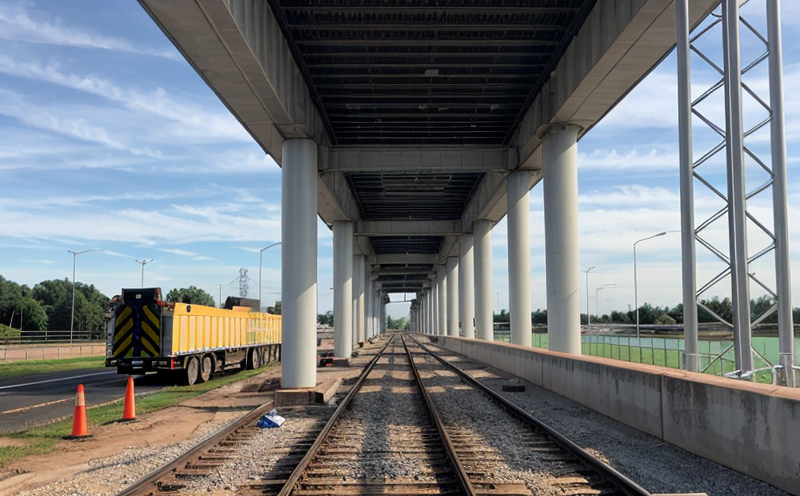ISO 6780 Bridge Fatigue Load Assessment
The ISO 6780 standard is a cornerstone in the structural integrity evaluation of bridges. This service ensures that structures withstand repeated loading cycles, which can lead to fatigue failures over time. The process involves precise measurement and analysis of load distribution and stress levels across critical sections of the bridge structure.
The testing begins with a thorough inspection of the bridge's design specifications and materials used in its construction. This is crucial for understanding the expected performance under various loading conditions. Specimen preparation includes identifying key areas where fatigue failures are most likely to occur, such as joints or regions subject to high stress concentrations.
Once the critical sections have been identified, specialized instrumentation is deployed to apply and monitor cyclic loads. The use of sophisticated load cells and strain gauges allows for real-time data collection on the structural response. This includes monitoring deflection, stress, and strain levels throughout each cycle.
The data collected during these tests are then analyzed against international standards like ISO 6780 to determine if the bridge meets fatigue resistance requirements. Compliance with these standards is essential for ensuring public safety and meeting regulatory expectations.
Results from this assessment provide valuable insights into the current condition of the bridge, identifying any potential weaknesses or areas that need further investigation. This information can be used by engineers and decision-makers to prioritize maintenance efforts, plan for upgrades, or make informed decisions about future design improvements.
The findings also contribute to the overall asset management strategy by providing a quantitative measure of remaining service life. Regular assessments like these help maintain infrastructure reliability and reduce risks associated with unexpected failures.
- Identify critical sections prone to fatigue failure
- Apply cyclic loads using specialized instrumentation
- Monitor real-time structural response through load cells and strain gauges
- Analyze data against ISO 6780 standards for compliance evaluation
- Provide actionable insights into the bridge's current condition and future maintenance needs
This service plays a vital role in safeguarding public safety by ensuring that critical infrastructure components are robust enough to handle real-world loading scenarios. By adhering strictly to international best practices, we provide accurate and reliable fatigue load assessments that contribute significantly to long-term asset management strategies.
Eurolab Advantages
EuroLab prides itself on offering cutting-edge services tailored specifically for the construction sector. Our team of experts leverages advanced technology and methodologies to deliver precise, accurate results every time. With years of experience in bridge fatigue load assessments, we have developed a reputation for excellence that is second to none.
- State-of-the-art instrumentation ensures reliable data collection
- Experienced engineers with deep knowledge of ISO 6780 standards
- Comprehensive reporting tailored to meet client needs
- Quick turnaround times without compromising on quality
- Cost-effective solutions that do not compromise on accuracy or reliability
We understand the importance of timely and accurate assessments, which is why we strive to minimize downtime while maintaining high standards. Our commitment to customer satisfaction extends beyond just delivering results; it includes providing clear explanations and recommendations based on our findings.
By choosing EuroLab for your bridge fatigue load assessment needs, you gain access to a network of experienced professionals who are dedicated to excellence in every project they undertake. Whether you're looking at routine inspections or addressing specific concerns, we have the expertise to provide you with comprehensive solutions.
Quality and Reliability Assurance
- Data Integrity: All data collected during testing is validated against multiple checks to ensure accuracy. This includes cross-referencing readings from different instruments to confirm consistency.
- Standard Compliance: The tests are conducted in strict accordance with ISO 6780 guidelines, ensuring that all aspects of the evaluation meet international standards for fatigue resistance assessment.
- Replication Testing: Where necessary, additional samples or sections may be tested to replicate findings from initial assessments. This helps verify results and builds confidence in the overall report.
- Expert Review: Reports undergo rigorous review by our team of certified engineers before finalization. Any discrepancies are resolved prior to submission, ensuring only high-quality documentation is delivered.
The quality assurance framework at EuroLab is designed to eliminate any doubt about the reliability and validity of our findings. Each stage of the testing process—from initial setup through final reporting—is meticulously documented and reviewed to maintain the highest standards possible.
Our commitment to excellence extends beyond just meeting minimum requirements; we aim to exceed expectations by providing robust, actionable insights that contribute positively to infrastructure management strategies. With EuroLab, you can trust in consistently accurate and reliable results every time.
Customer Impact and Satisfaction
- Enhanced Safety: By identifying potential weak points early on, this service helps prevent accidents and injuries associated with structural failures.
- Informed Decision Making: The detailed reports generated by our tests empower stakeholders to make informed decisions regarding maintenance schedules, upgrades, and other interventions.
- Asset Preservation: Regular assessments like these help preserve the integrity of critical infrastructure components, extending their useful life significantly.
- Regulatory Compliance: Ensuring compliance with international standards not only meets legal requirements but also enhances reputation among peers and clients.
The impact of this service reaches far beyond individual bridges; it contributes to broader goals related to sustainable development, public safety, and efficient resource utilization. Our customers benefit from improved infrastructure reliability, reduced risk exposure, and enhanced asset value over time.
Customer satisfaction is a key priority for EuroLab. We aim to exceed expectations by delivering high-quality services that not only meet but often surpass client requirements. Feedback from past projects has consistently highlighted the value provided by our fatigue load assessment service, reinforcing our commitment to continuous improvement.





